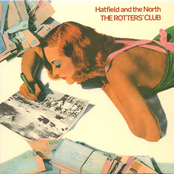The Rotters' Club

Biography
Hatfield and the North's second LP stands as a high watermark for the prog rock associated with England's Canterbury scene and, while filled with stunning musicianship, demonstrates both the strengths and some of the weaknesses of the Hatfield style. Dave Stewart on keyboards, Phil Miller on guitar, Richard Sinclair on bass and vocals, and Pip Pyle on drums (supplemented by a few guest instrumentalists and the ever-ethereal Northettes with their "la la" backing vocals) generally show an admirabl...
Hatfield and the North's second LP stands as a high watermark for the prog rock associated with England's Canterbury scene and, while filled with stunning musicianship, demonstrates both the strengths and some of the weaknesses of the Hatfield style. Dave Stewart on keyboards, Phil Miller on guitar, Richard Sinclair on bass and vocals, and Pip Pyle on drums (supplemented by a few guest instrumentalists and the ever-ethereal Northettes with their "la la" backing vocals) generally show an admirable sense of restraint and, like their Canterbury peers, are careful to avoid the pomposity and bombast of better-known prog rockers of the era, such as Emerson, Lake & Palmer and Yes. But the Hatfields might actually have been light to a fault, particularly whenever a segue from one of their convoluted instrumental passages into a Richard Sinclair vocal vehicle occurred. Sinclair shares a bit of Robert Wyatt's singing approach, or at least Wyatt's more whimsical side, but his polite and mellow croon, while pleasant, is less idiosyncratic and ultimately rather bland. And, don' t look for much importance from the songs' nearly empty lyrical content; perhaps this was another conscious attempt to steer clear of the pretentiousness of the typically overbearing prog rock song style, but the words leave precious little to sink the listener's teeth into. Things actually get off to a relatively strong start with "Share It," a catchy little number with Sinclair expressing some idealistic and hard-to-criticize Brit hippie sentiments. At the several other places where vocals crop up, however, it's all a bit empty-headed and self-referential. Thankfully, these songs are few and far between, but they're still rather hard to avoid; the Hatfields were masters of the segue and the most masterly demonstrations of instrumental technique wind up bleeding into some pretty dumb stuff from Sinclair's pipes. (In fairness, he isn't credited with writing all the words he wound up singing.) Nevertheless, Stewart, Miller, and Pyle all make some wonderful statements, as does Sinclair on bass for that matter. Particularly noteworthy are Miller's two short jazzy instrumentals, "Lounging There Trying" and "Underdub," which, with their sparkling electric piano work from Stewart, have a light and airy improvisational feel despite rather thorough scoring; Pyle's propulsive "Yes No Interlude" with its furious melding of Stewart's keyboards and the sax of guest Jimmy Hastings; and Stewart's 20-minute opus "Mumps." The latter is particularly impressive, with everything anyone would want from an extended-form Canterbury-style workout. The piece ebbs and flows through nimbly executed thematic passages and variations, featuring one of Stewart's most compelling themes and also one of the best fuzz organ solos that he (or Mike Ratledge or David Sinclair for that matter) ever recorded. Then, smack dab in the middle of it all, here comes Sinclair with a throwaway tune using letters of the alphabet as words; it really interrupts the flow. Everything is retrieved with a dramatic instrumental coda, though, melding spacy effects, more great organ playing from Stewart, and spectacularly executed unison lines from Miller and Hastings in crescendo before the final fade. All that lightweight stuff is forgotten. The Virgin Records CD reissue features several live bonus tracks (also found on the Afters compilation), including two comparatively crazed and heavy Miller instrumental pieces recorded in France and, from a date at the Rainbow Theatre in London, Sinclair's "Halfway Between Heaven and Earth," which has a bit more of the feel of his vocal work with Caravan than with the Hatfields. Too bad there's a premature fadeout during another great Stewart organ solo. One wonders where the band was headed with that. Read more on Last.fm. User-contributed text is available under the Creative Commons By-SA License; additional terms may apply.
